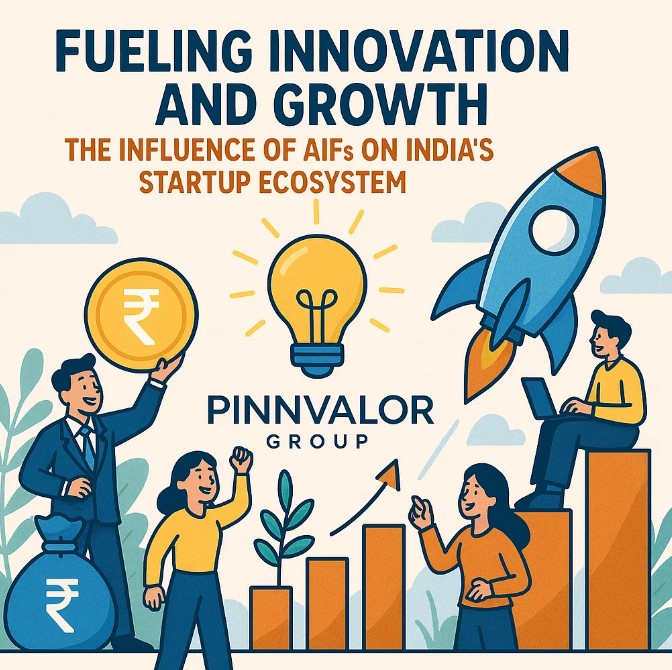
Fueling Innovation and Growth: The Influence of AIFs on India’s Startup Ecosystem
India’s startup ecosystem has witnessed unprecedented growth over the last decade, evolving into one of the most dynamic and vibrant hubs for innovation globally. Central to this evolution is the increasing role played by Alternative Investment Funds (AIFs), which have emerged as a critical catalyst for fueling innovation and growth within the country’s entrepreneurial landscape. This blog explores how AIFs are shaping India’s startup ecosystem, driving value creation, and fostering sustainable economic development.
What role do Alternative Investment Funds play in unlocking the true potential of India’s startups?
By bridging funding gaps and offering strategic expertise, AIFs are transforming India’s startup landscape into a vibrant engine of innovation and opportunity.
Understanding Alternative Investment Funds (AIFs)
Alternative Investment Funds are privately pooled investment vehicles that collect capital from sophisticated investors to invest in accordance with a defined investment policy. In India, AIFs are regulated by the Securities and Exchange Board of India (SEBI) under the SEBI (Alternative Investment Funds) Regulations, 2012. AIFs are broadly classified into three categories:
- Category I: Funds that invest in startups, small and medium enterprises (SMEs), infrastructure, and social ventures.
- Category II: Funds that do not fall under Category I and III and typically include private equity and debt funds.
- Category III: Funds employing complex or leveraged strategies, including hedge funds.
Among these, Category I AIFs are particularly relevant to the startup ecosystem as they actively support early-stage and growth-stage ventures.
The Growing Role of AIFs in India’s Startup Ecosystem
1. Bridging the Funding Gap
Startups, especially in early stages, often face challenges in securing adequate funding from traditional sources such as banks and public markets. AIFs have stepped in to fill this gap by providing much-needed capital to startups with high growth potential but unproven track records. This has enabled many promising startups to scale their operations, invest in product development, and expand their market reach.
2. Enhancing Access to Professional Expertise
Beyond capital infusion, many AIFs bring in seasoned industry experts and mentors who provide strategic guidance, operational support, and governance frameworks. This expertise helps startups navigate business challenges, build scalable models, and adopt best practices that improve their chances of success.
3. Encouraging Innovation and Risk-Taking
By pooling resources from high-net-worth individuals, institutional investors, and family offices, AIFs assume higher risk appetites than conventional financing sources. This willingness to invest in innovative ideas and disruptive technologies encourages startups to pursue ambitious projects that might otherwise remain unfunded.
4. Supporting Sectoral Diversification
AIFs often focus on niche sectors such as fintech, healthtech, edtech, and renewable energy. This targeted approach helps diversify India’s startup ecosystem, fostering innovation across various industries and driving holistic economic growth.
5. Driving Employment and Economic Growth
As AIF-backed startups scale, they create substantial employment opportunities and contribute to GDP growth. The multiplier effect of successful startups strengthens ancillary industries and stimulates regional development, thereby enhancing the overall entrepreneurial environment.

Challenges and Opportunities
While AIFs have positively impacted India’s startup ecosystem, certain challenges remain:
- Regulatory Complexities: Although SEBI regulations provide a framework, navigating compliance can be complex for both fund managers and startups.
- Liquidity Concerns: Investments in startups are typically illiquid, which may deter some investors seeking quicker exits.
- Valuation Risks: Early-stage startups often have uncertain valuations, increasing investment risks.
Despite these challenges, evolving regulatory frameworks and increasing investor sophistication are gradually mitigating these risks, making AIFs an even more attractive investment vehicle.
The Future Outlook
India’s startup ecosystem is poised for further growth, bolstered by technological advancements, digital penetration, and favorable government policies such as Startup India. In this landscape, AIFs will continue to play a pivotal role by:
- Scaling investment across emerging sectors like AI, blockchain, and clean energy.
- Facilitating cross-border investments and global partnerships.
- Enhancing ESG (Environmental, Social, Governance) compliance in portfolio companies.
- Leveraging data-driven investment strategies for smarter capital allocation.
With their ability to mobilize large pools of capital and deliver strategic value, AIFs will remain indispensable partners in nurturing India’s startup ecosystem, ultimately contributing to sustainable economic progress and innovation leadership.
Conclusion
Alternative Investment Funds have become a powerful force fueling India’s startup ecosystem by bridging financing gaps, promoting innovation, and accelerating growth. Their evolving role underscores the symbiotic relationship between capital providers and entrepreneurs, a dynamic that is vital for India’s emergence as a global startup powerhouse. As the ecosystem matures, AIFs will undoubtedly continue to shape the trajectory of innovation and economic development in the country.
